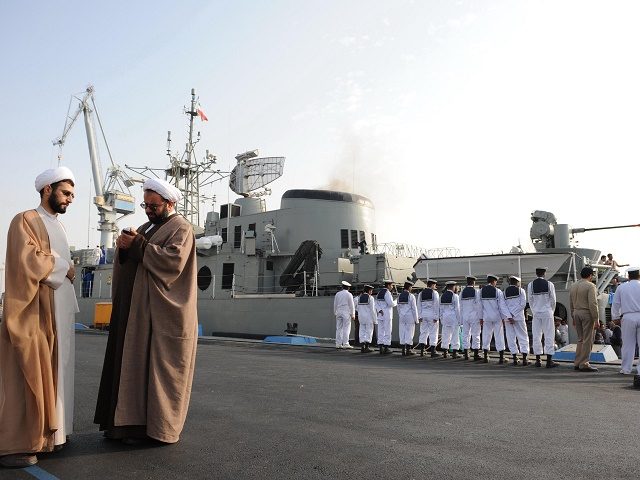Secretary of State Mike Pompeo on Monday evening dismissed Iran’s claim to control the Strait of Hormuz and the entire Persian Gulf. Pompeo promised that the United States would continue to protect freedom of navigation in those international waterways.
Iran, reeling under sanctions pressure from the U.S. and unable to persuade Europe to rescue its tottering economy, resorted to its time-honored tactic of threatening to close the Strait of Hormuz on Monday. Iranian leaders argued that if the U.S. effectively shuts down Iranian oil exports with an even tougher round of sanctions in November, then no one else should be allowed to move oil through the Persian Gulf.
About 18 million barrels of oil pass through the Strait of Hormuz every day, accounting for over 30 percent of all oil shipments by sea, so a blockade would be tantamount to hitting world energy markets with a weapon of mass destruction. Even a temporary disruption in shipping would inflict billions of dollars in damage upon the rest of the world.
The Iranian military staged a major naval drill at the beginning of August intended to demonstrate their ability to “swarm” the straits with small boats that could interdict shipping. The commander of the Islamic Revolutionary Guard Corps navy declared on Monday that Iran has “full command over the Persian Gulf.”
Pompeo dismissed this belligerent claim with a tweet on Monday evening:
The Islamic Republic of Iran does not control the Strait of Hormuz. The Strait is an international waterway. The United States will continue to work with our partners to ensure freedom of navigation and free flow of commerce in international waterways.
— Secretary Pompeo (@SecPompeo) August 27, 2018
Retired Admiral James Stavridis, formerly supreme allied commander of NATO, told CNBC on Monday that Iran could temporarily block the Strait of Hormuz, but the U.S. Navy would swiftly clear the blockade. He warned the threat of constant Iranian terrorist attacks against shipping would be more of a long-term problem than an outright brigade.
“There is the possibility of ongoing use of mines and diesel submarines and the use of other surreptitious methods by Iran that would likely close the Strait on and off again, but the U.S. Navy would be prepared for those eventualities,” said Stavridis.
Ibrahim al-Muhanna, the energy minister of Saudi Arabia, said on Tuesday that Iran lacks the military power to close either the Strait of Hormuz or the Bab el-Mandeb Strait on the Red Sea, which Iran has threatened by providing the Houthi rebels of Yemen with anti-ship missiles.
Muhanna predicted that if Iran does attempt to close the straits, the U.N. Security Council will swiftly authorize overwhelming international military action to remove the threat.
The U.S. Navy has been carefully monitoring Iranian naval activity since the big swarming exercise in early August and has encouraged other Gulf interests such as Saudi Arabia to make strong commitments to the freedom of navigation.
Secretary of Defense Jim Mattis made it clear that Iran will not be allowed to interfere with international shipping when the IRGC’s “swarming” exercise commenced on August 2:
Iran has threatened to close the Strait of Hormuz. They’ve done that previously in years past. They saw the international community put – dozens of nations of the international community put their naval forces in for exercises to clear the straits. Clearly, this would be an attack on international shipping, and – and it would have, obviously, an international response to reopen the shipping lanes with whatever that took, because of the world’s economy depends on that energy, those energy supplies flowing out of there.
U.S. Naval Forces Central Command reiterated this commitment in a statement to Fox News on Monday: “The U.S. and our partners provide and promote security and stability in the region on a daily basis. Together, we stand ready to ensure the freedom of navigation and the free flow of commerce wherever international law allows.”
As other advisers put it to Fox News, the Iranians are probably aware that the United States can erase their naval forces quickly, but they can also threaten international shipping with land-based missiles and explosive-laden terrorist boats that would require a significant military escalation to completely shut down. Although it was not widely reported at the time, U.S. officials said the IRGC navy’s swarming exercise was accompanied by the test-firing of a ballistic missile from an IRGC base in southeastern Iran.
Current shipping activity and world oil markets suggest little impact from Iran’s threats on the energy industry, but that confidence might be reinforced by the perception that Iran is unlikely to cross the red line of a blockade before the second round of U.S. sanctions goes into effect on November 4.

COMMENTS
Please let us know if you're having issues with commenting.